Game 1 takeaways: Leonard, Siakam overwhelm Sixers in series opener
The Toronto Raptors dominated the Philadelphia 76ers 108-95 in Game 1 of their Eastern Conference semifinal, notching just the third series-opening win in franchise history.
Here are some takeaways from Toronto's fifth consecutive playoff victory:
Dynamic Duo
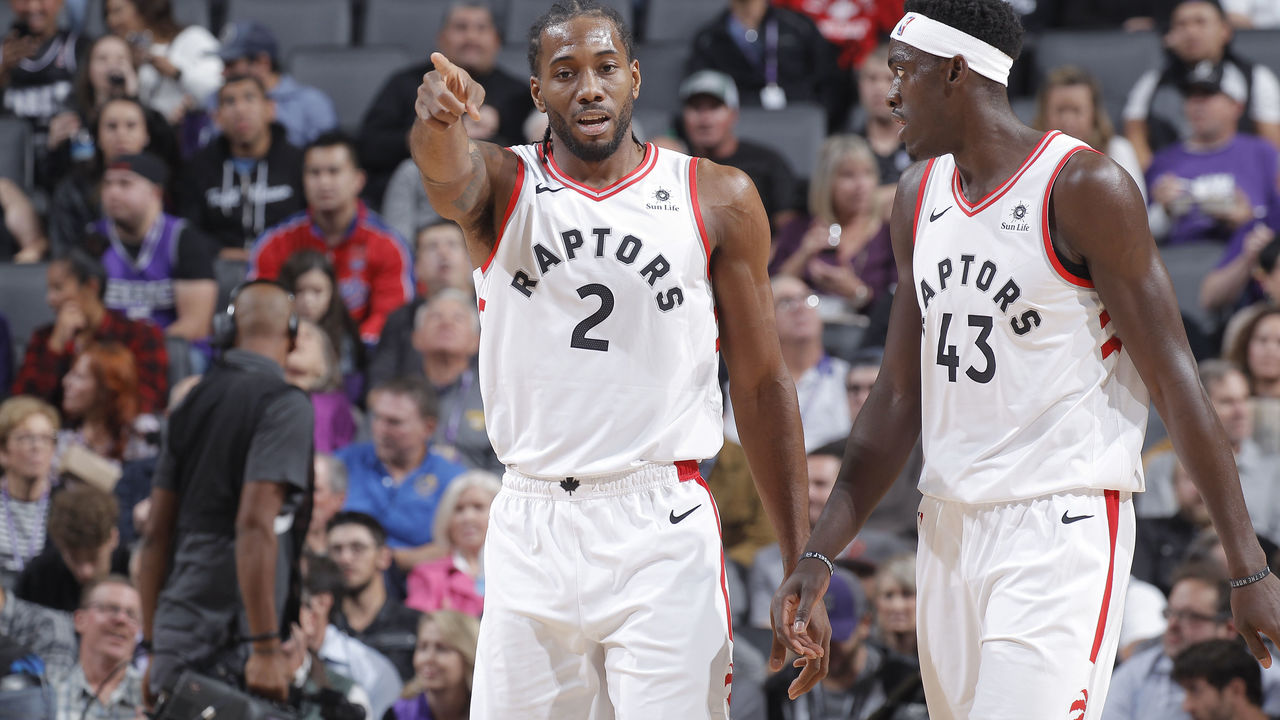
Kawhi Leonard put on an epic scoring display in Game 1, but Pascal Siakam's production was almost equally absurd.
Leonard scored 45 points on 16-of-23 shooting in a game-high 38:12 of action, picking the 76ers apart in mesmerizing fashion. Ben Simmons and Tobias Harris took some of the abuse, but Kawhi used the bulk of his powers against Jimmy Butler. Butler, the four-time All-Defensive team selection whose physical strength often sees him bully opposing scorers, was reduced to a helpless, undersized sieve against Leonard.
"I don't think we showed enough help," Simmons said of the Sixers' team defense against Leonard. "I think as a team, we need to treat him similar to Giannis (Antetokounmpo) and come help a little bit more to get the ball out of his hands. Downhill, he's one of those guys who can get a bucket easily."
Meanwhile, Siakam - the Most Improved Player frontrunner - needed only 20 individual possessions to net 29 points, starting the game off with a pull-up jumper from the midrange before showing the Sixers his dizzying array of post moves, runners, and leaning bank-shots. With Philadelphia playing off him and daring him to shoot, Siakam also knocked down three of his four 3-point attempts.
Leonard and Siakam won't always combine for a whopping 1.48 points per possession, as they did Saturday night in Toronto. But with the Raptors surrounding the duo's all-around scoring abilities with a plethora of shooting and playmaking, concocting a defensive gameplan against this team is becoming a nightmarish task.
Matching minutes
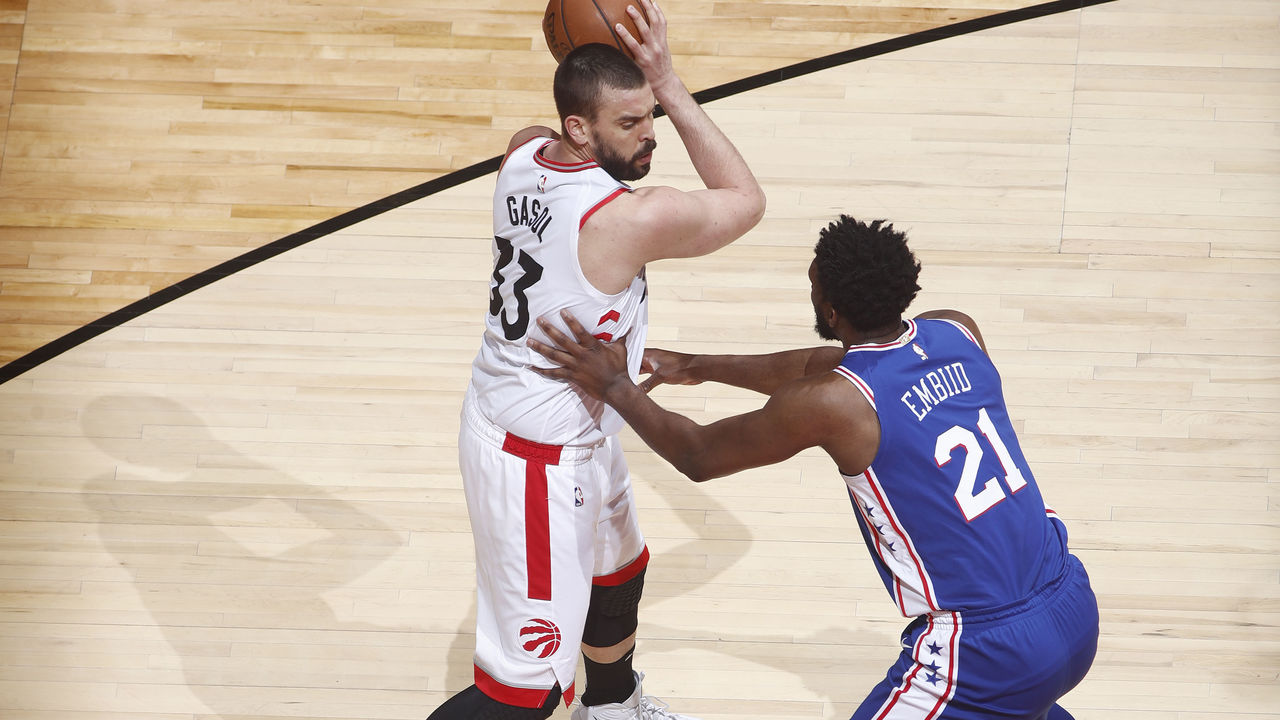
After nullifying Magic All-Star Nikola Vucevic in the opening series, Marc Gasol has bigger fish to fry in Round 2. And if Joel Embiid's Game 1 performance was any indication, Gasol is up for the task.
The veteran big man is one of the few players who can come close to matching Embiid's size and strength. The Sixers often ran into offensive trouble in Game 1 simply because Gasol forced Embiid to catch the ball farther from the hoop than he normally would, or made him take an extra second or two to establish any type of post position. In the end, the 76ers' most potent threat finished with 16 points on 5-of-18 shooting.
Given the importance of Embiid's success for the Sixers, and how consistently Gasol has neutralized him this season, Toronto head coach Nick Nurse should consider matching Gasol against Embiid's every minute for the remainder of the series, barring foul trouble or any other factor that might prevent him from doing so. During Game 1, it was a matchup Nurse managed in just 17 of Embiid's 30 minutes, and the results were telling:
| Embiid's Game 1 | Gasol on court | Gasol off |
|---|---|---|
| Minutes | 17 | 13 |
| Points | 3 | 13 |
| Field goals (3P) | 1-of-8 (0/1) | 4-of-10 (1/2) |
| OReb | 0 | 2 |
| +/- | -10 | +14 |
"You have to give credit to Marc Gasol. He was a Defensive Player of the Year for a reason," 76ers head coach Brett Brown said of Embiid's Game 1 struggles. "I have to help him more. I think getting into the post different ways, freeing him up a little bit more is something I have to look at."
At the other end of the court, whether it's Gasol or Serge Ibaka manning the middle for Toronto, the Raptors' big men need to continue pulling Embiid away from the basket. The Sixers' defense is a shell of itself without Embiid protecting the rim, and given Embiid's knee troubles, every extra foot of space he's forced to cover could add up over the length of the series.
Battle of the benches and lineup tinkering
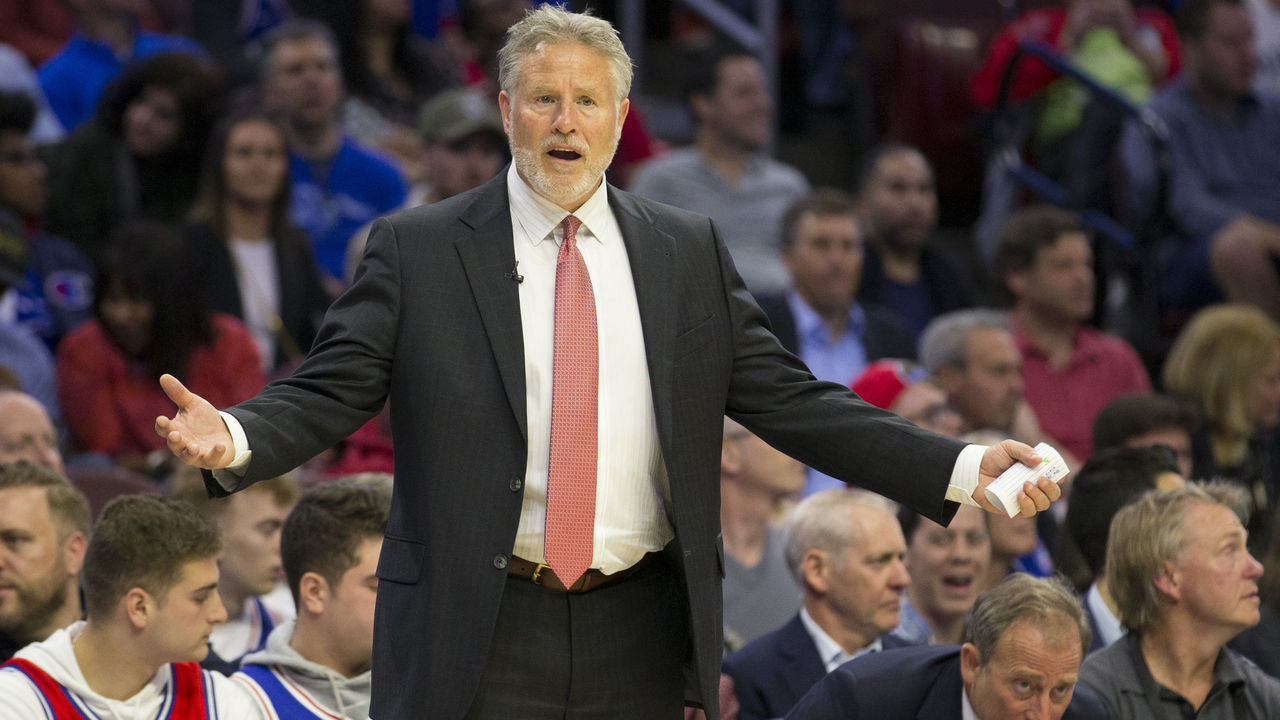
Magnified by the absences of Toronto's OG Anunoby and Philly's Mike Scott, the Raptors and 76ers are star-laden teams currently without much depth, going seven or eight deep, at best. If one team gains an advantage in its bench-heavy minutes, it could open up a series that's expected to see little separation between the two starting lineups.
Given how well Toronto's starters have fared thus far, this looks to be more crucial for Brown's 76ers and could be the reason for his chaotic rotation management in Game 1.
Even though Gasol played just 25:49, TOR starting lineup played more minutes together than PHI starting lineup...
— John Schuhmann (@johnschuhmann) April 28, 2019
All 10 starters on the floor: TOR 30, PHI 25 in 10.8 min.
TOR starters otherwise: TOR 33, PHI 21 in 10.5 min.
PHI starters otherwise: PHI 21, TOR 13 in 8.8 min.
Despite the strength of Philadelphia's starting five, Brown didn't keep his starting unit together for particularly long stretches. With no foul trouble to blame, Embiid went to the bench fewer than six minutes into the game, and Simmons left the floor fewer than five minutes into the second half.
These substitution patterns allow Brown to use his stars to prop up reserve units later in halves, especially against a Raptors team that is one of the few in the NBA with the ability to best Philly's starting lineup. It also means the Sixers can field their entire starting lineup at the start of the second and fourth quarters, an extremely rare look.
Philly's advantages
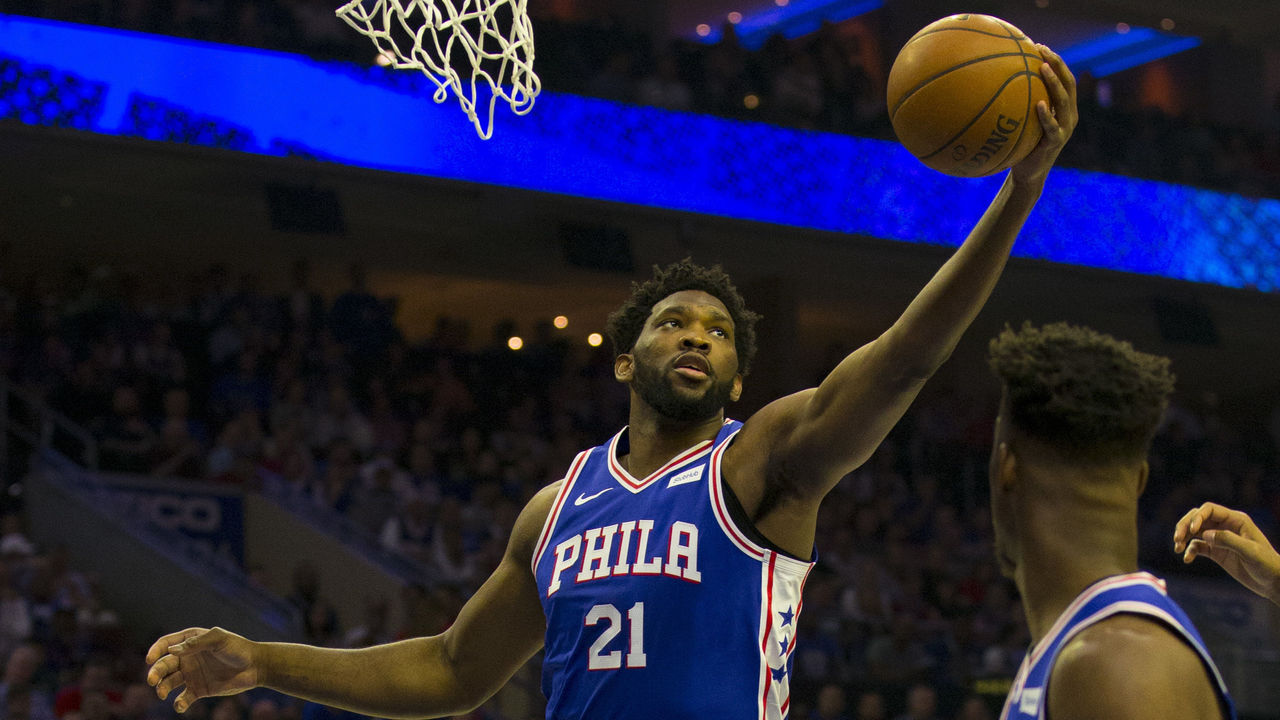
The Raptors appear to have distinct advantages across some of the star matchups between these teams, especially if Gasol can continue his defensive success against Embiid. But the 76ers do have some gameplay advantages to exploit. Namely, they can wreak havoc on the offensive glass, and they draw a ton of fouls.
Philadelphia finished 11th in offensive rebounding during the regular season and led all first-round teams with a gargantuan 34.5 percent of available offensive rebounds against Brooklyn. It also had the second-best free-throw attempt rate of the regular season, getting to the charity stripe 0.312 times per field-goal attempt compared to the league average of 0.259. The Raptors, meanwhile, finished in the bottom half in defensive rebound rate (18th) and a middling 12th in opponents' free-throw attempt rate.
The Sixers worked one of those advantages in Game 1, outscoring the Raptors 14-2 in second-chance points thanks to a robust 29.3 percent offensive rebound rate (league average is 22.9). But Toronto's savvy vets did an admirable job defending the Sixers without putting them on the line. The Raptors committed three more fouls than the Sixers did on Saturday but attempted three extra free throws. Toronto also held a Philly team that usually attempts 26.9 free throws per 100 possessions to 21 attempts on 97 Game 1 possessions.
Quote of the game
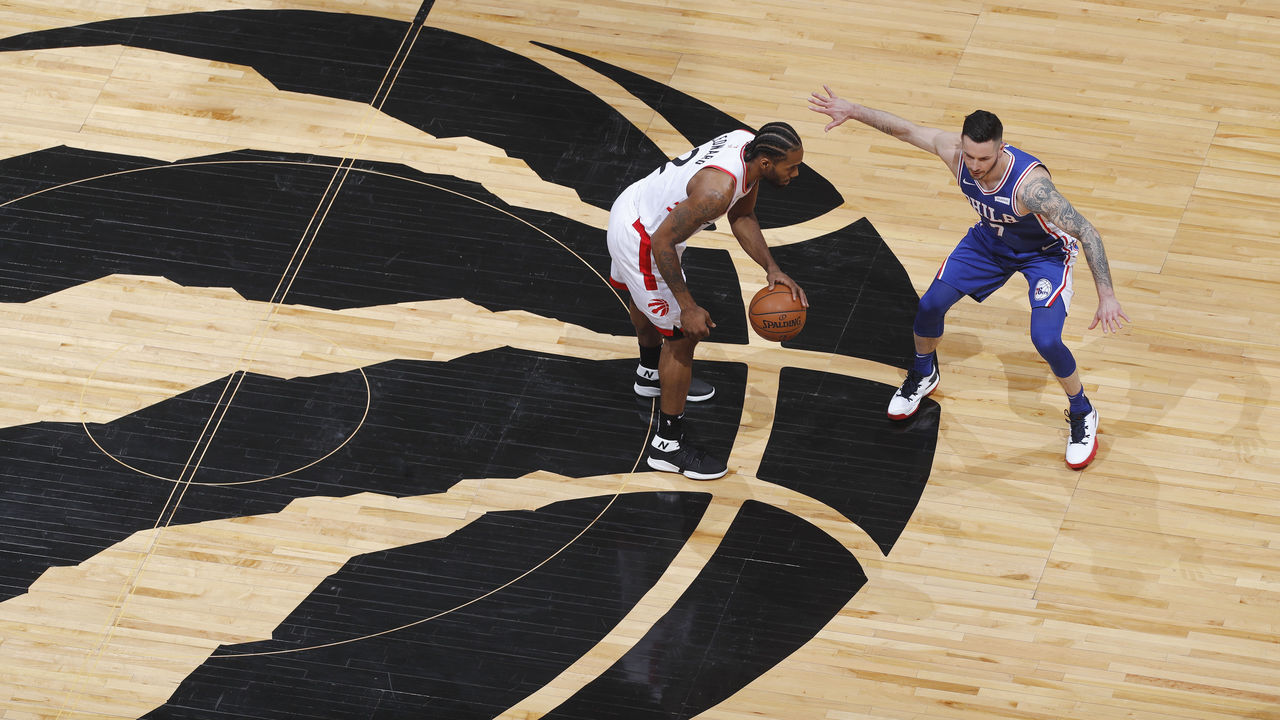
"He's a spectacular player, he had a spectacular night, and he hit some spectacular shots." - JJ Redick on Leonard's performance.
After a Game 1 performance featuring a postseason career-high 45 points along with 11 rebounds, Leonard's now averaging 30.7 points, 7.3 rebounds, 2.8 assists, and 1.3 steals on 58-51-89 shooting through six playoff games as a Raptor. Though we're less than halfway through the playoffs, it's worth noting that no player has ever averaged 30-plus points on an effective field-goal percentage of 65-plus in a single postseason, as Leonard is currently doing.
What to watch for
The transition game. The Raptors thrive in transition - no team was more efficient there this season. The Sixers, meanwhile, are notoriously bad at taking care of the ball, ranking 24th in turnover rate in 2018-19 after finishing 29th or 30th in that metric in each of the previous four seasons.
Philadelphia committed 16 turnovers on Saturday, leading to 22 Raptors points.